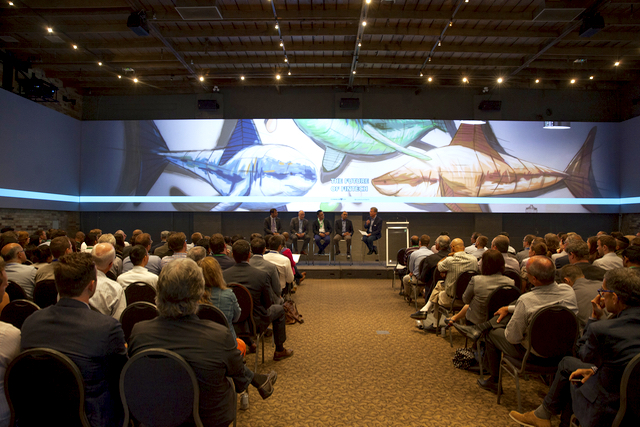When it comes to managing money, Canadian banks have enjoyed a long tradition of safety and predictability.
But in today’s digital age, everything is changing – and the financial world is one of the industries most ripe for disruption.
And whether as a disruptor or as an aid, tech is playing a key role in how our banks are evolving.
On Tuesday night, executives from Canada’s four largest chartered banks gathered at the Tannery Event Centre to discuss how financial tech – or FinTech – is shaping the future of banking.
The venue was packed, with over 330 in attendance. Financial professionals wore green lanyards while startups wore blue ones to facilitate easy connections. After a half-hour of networking, representatives from TD, Scotiabank, RBC and BMO took the stage for a panel discussion on the financial tech industry.
Before the panel, the executives met with startup entrepreneurs from the Toronto-Waterloo corridor to discuss how technology could mitigate against challenges in the financial industry.
While startups may have industry-changing solutions, getting them to market is not easy. With banks becoming increasingly multi-faceted, banking executives recognize that finding ways for FinTech startups to get their solutions to the right people within Canada’s largest banking organizations is a challenge.
“These types of events are absolutely the right way,” said Cesar Rainusso, Vice President and Head of Digital Channels at BMO. “I certainly got a ton out of it. I learned a lot, got educated, and now they’re on top of my list of solutions that I am trying to bring to market . . . the next time I’m thinking of something, this is one of the places I’m going to look.”
Of course, meetings were also beneficial to the entrepreneurs. Harry Scanlan, co-founder of Silqe, a financial intelligence startup based in the Communitech Hub, was just one who had a chance to get quality feedback directly from Canada’s top banking executives.
“We might not normally have an opportunity to meet these banks,” said Scanlan. “You are a smaller fish in a big sea. As a startup, we focus on a certain aspect that we think is good, but when we talk to these larger corporations, they can actually give us different ideas that we’d never even think of before.”

The Tannery Event Centre was packed during the FinTech panel discussion.
(Communitech photo: Meghan Kreller)
After the one-on-one meetings and some networking, the banking executives faced a buzzing, tech-savvy audience, ready to share insights on the future of FinTech. Steve McCartney, Vice President of Startup Services at Communitech, facilitated the conversation.
The executives were asked to address the biggest challenge that tech is presenting to their bank. They agreed that keeping pace with rapidly changing customer expectations is a central challenge for their organizations.
Rizwan Khalfan, Chief Digital Officer at TD Bank Group, pinpointed the smartphone as the epicentre of the rapid change happening in the banking industry.
“It’s raising customer expectations, changing consumer behaviour and preferences. And for that we have to be more innovative. It’s imperative to be able to tap into the region’s ecosystem to get ahead and stay ahead of customer expectations.”
Besides smartphones, there are many drivers behind changing industry expectations. Mike Henry, Senior Vice President and Head of Retail Payments, Deposits and Lending at Scotiabank, homed in on three big ones.
“First is security,” said Henry. “Not only are we seeing advances in what consumers expect, but we are also facing new and different and more frequent attacks every single day. The second point is customer experience. And the third for me is, how do we get better at using the ever-increasing amounts of data that are out there and use that to track value for our customers?”
Big data is a hot topic in and beyond the Waterloo Region ecosystem, and is clearly of interest to the financial industry. While none of the execs could definitively predict what insights big data will produce, the feeling at Tuesday’s event was that understanding how to leverage data will be critical for the future of financial tech.
“The first step is how do we do more with what we’ve got,” said Gabriel Woo, Vice President, Solution Acceleration – Digital, Payments and Cards at RBC. “There’s a mountain of data out there today. If you see the forecast of how the Internet of Things is going to evolve, there’s going to be logarithmic pattern in the way the data is going to be increasing.”
Leveraging data better, while protecting customers’ privacy, keeping up technically, and maintaining personal connections to customers, is not easy. Neither is keeping up to current trends while also mobilizing for future ones. The banking executives understand that alone, they cannot possibly do it all. All four said they will continue to look to tech-savvy startups to help them meet the constant wave of changing industry standards and expectations.
Among the changes to the banking industry prompted by the digital age, customers still expect some things to stay the same.
“What doesn’t change are people’s values,” said Henry. “People still value being connected to something bigger than themselves, people still value trust, people still value relationships. Our task is to look for how to maintain those trusting relationships to our customers even as the way in which they interact with us changes because of technology.”

